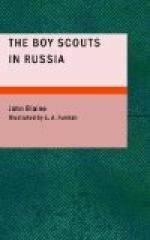“I’m sorry, Herr Lieutenant,” said Schmidt. “My poor beast is very tired, and he is carrying an extra burden. He has had more work to do to-day than any of the others. If you would permit me to drop behind and come in alone—it is not so far now?”
“Very well,” said the lieutenant. “We’ll never get there if we hang back waiting for you.” And he gave the word to ride on.
Schmidt at once began to take things more easily. Fred heard him grunting to himself.
“Those verdamter young officers!” he grumbled. “Just because they have a pair of shoulder straps, they think they know it all! I would like to put some of them across my knee!”
Fred knew enough of German discipline to be vastly amused by this. But he had no time now to think of trifling things. His whole energy was devoted to finding some way to turn this new circumstance to his own advantage. It seemed to him that there ought to be some way of managing it. And in a moment he got the idea. Schmidt was as tired as his horse, or even more so, and by this time he was swaying in his saddle and half asleep, as a trained horseman often does. Fred leaned forward and very quietly cut the saddle girth almost through. He knew that the slightest strain would finish the work. Schmidt was utterly unconscious of what was going on. Fred could tell, from the man’s breathing, just what his condition was. He would snore a little and then, with a start, he would arouse himself, breathing normally for a minute. Then the snoring would start again. He was trusting himself entirely to his horse.
Dusk had fallen now, and Fred decided that it was time to see if his plan was feasible. He took a handkerchief from his pocket, rolled it into a ball, and flung it straight ahead, so that it fell, unrolling, right before the horse’s eyes. The effect was inevitable. The frightened horse reared. At the strain the severed girth gave, and the saddle, rolling, spilled both Schmidt and Fred into the road, while the horse bolted. Fred lay still, watching Schmidt, who rose, cursing fluently, and stood for a moment staring stupidly after his horse. Then he began to call, and broke into the awkward, lumbering run of the cavalryman.
Fred might have slipped away then, but he was sure that Schmidt would catch the horse, which must, he thought, be trained to stop even after a momentary panic. And it was not his plan to seize a chance that might after all not be as good as it looked. He wanted to make as sure as possible of getting away. And now, as soon as Schmidt had started after the horse, he crawled over to the saddle, which lay where it had fallen. He took the heavy revolver from the holster and was duly grateful for one thing he had noticed—these Uhlans carried no carbines. Their only weapons, seemingly, were their lances and the revolvers in their holsters.
He was not a moment too soon. Schmidt came back almost at once, leading his horse. He was scolding it for running, and he was also expressing his opinion of government saddles and leather. He found the broken girth, and sat down at once to mend it. Fred scarcely dared to breathe for a moment. But Schmidt did not notice the empty holster, and though he growled and swore when he saw how the girth had snapped, he did not seem to notice that it had been cut almost through.




